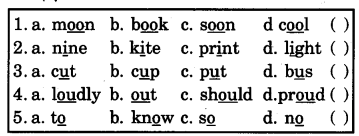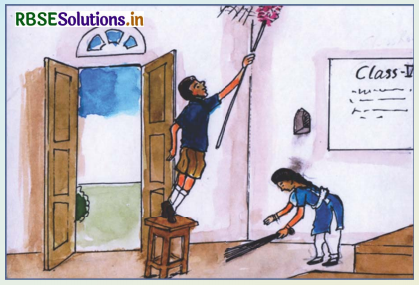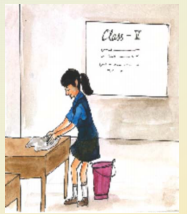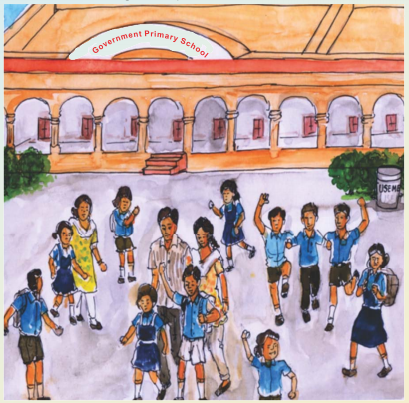RBSE Solutions for Class 5 English Chapter 4 School is a Temple
Rajasthan Board RBSE Solutions for Class 5 English Let's Learn English Chapter 4 School is a Temple Textbook Exercise Questions and Answers.
RBSE Class 5 English Solutions Chapter 4 School is a Temple
Activity - I
A. Choose the correct alternative.
सही विकल्प चुनिए।
Question 1.
Raju and Manjeet were quarrelling over..........
(a) water
(b) bits of paper
(c) pencils
(d) cobwebs.
Answer:
(b) bits of paper
Question 2.
We should ............. our parents.
(a) not help
(b) disobey
(c) ignore
(d) help.
Answer:
(d) help.

B. Write T for true and F for false statements.
सही कथनों के लिए 'T तथा गलत कथनों के लिए 'F' लिखिए।
1. Raju and Bittu were quarrelling. ( )
2. Neha fetched water with her mother from a pond. ( )
3. With dedication to our duty we can make Bharat beautiful. ( )
4. We should throw bits of papers in the classroom. ( )
5. The atmosphere of the school should be friendly.
Answer:
1. (F),
2. (F),
3. (T),
4. (F),
5. (T).
C. Answer the following questions.
निम्नलिखित प्रश्नों के उत्तर दीजिए।
Question 1.
What is the name of the class monitor ?
कक्षा नायक का क्या नाम है?
Answer: The name of the class monitor is Raju.
कक्षा नायक का नाम राजू है।
Question 2.
Who helps his father at the shop?
दुकान पर कौन अपने पिताजी की सहायता करता है?
Answer:
Bittu helps his father at the shop.
बिट्ट दुकान पर अपने पिताजी की सहायता करता है।
Question 3.
Is Neha a good girl ? How?
क्या नेहा एक अच्छी लड़की है? कैसे?
Answer:
Yes, Neha is indeed a good girl. She helps her mother in fetching water from the well and also helps her in the kitchen.
हाँ, बेशक नेहा एक अच्छी लड़की है। वह अपनी माँ के साथ कुएँ से पानी भरकर लाती है तथा रसोई में भी उनकी मदद करती है।

Question 4.
Whose duty is it to keep our surroundings clean ?
आपने आस-पास के क्षेत्र को साफ रखने की जिम्मेदारी किसकी है?
Answer:
It is our duty to keep our surroundings clean.
अपने आस-पास के क्षेत्र को साफ रखने की जिम्मेदारी हमारी (खुद की) है।
Question 5.
Where should we throw bits of papers or garbage ?
हमें कागज़ के टुकड़े अथवा कूड़ा-करकट कहाँ पर फेंकना चाहिए?
Answer:
We should throw bits of papers or garbage only in the dustbin.
हमें कागज़ के -टुकड़े अथवा कूड़ा-करकट केवल कूड़े के डिब्बे में ही फेंकना चाहिए।

Activity - II.
(A). Choose the correct word from the box and fill in the blanks.
बॉक्स में से सही शब्द चुनकर रिक्त स्थानों में भरिए।
quiet, dirty, floor, cobweb, room
1. A spider makes ................ on the wall.
2. Pooja washed the ................ clothes in the washing machine.
3. We should keep ................ in the library.
4. With the help of a .............., I clean my room daily.
5. The peon mixed some floor cleaner in the water and then wiped the ...........
Answer:
1. cobweb
2. dirty
3. quiet
4. broom
5. floor.
(B) Match the following things with the works they are used for.
निम्नलिखित वस्तुओं का उनके उपयोग के अनुसार कार्यों से मिलान करें।
|
A |
B |
|
piece of cloth |
to throw garbage in |
Answer:
|
A |
B |
|
piece of cloth |
to wipe the floor to clean dirt/dust to write on the blackboard to throw garbage in to sit upon |

(C) Arrange the jumbled letters to make meaningful words :
अव्यवस्थित वर्गों को क्रम में रखकर सार्थक शब्द बनाएँ।
a. ceobwb
b. sparcs
c. borom
d. tmpele
d. mitoonr
Answer:
a. cobweb,
b. scraps,
c. broom,
d. temple,
e. monitor
Activity - III.
Listen to these words spoken by your teacher and speak them aloud.
अध्यापक द्वारा बोले गए इन शब्दों को सुनिये एवं उन्हें 300 RRI stool (स्टूल) school (स्कूल) rule (रूल)


Did you notice every group of words has similar ending sound ? Now speak the words given below and find out the word with a different sound (for the underlined letters) in each of the groups.
क्या आपने ध्यान दिया कि प्रत्येक शब्द-समूह का अंतिम उच्चारण एक समान है? अब नीचे दिए गए शब्दों को बोलिए तथा प्रत्येक समूह में भिन्न उच्चारण वाले (रेखांकित किए हुए वर्गों के लिए) शब्द का पता लगाइए।

Answer:
1. b, 2.c, 3.c, 4.c, 5. a
Activity - IV.
Look at the following sentences and understand the meaning of the underlined word.
निम्नलिखित वाक्यों को देखिए तथा रेखांकित किए शब्द के अर्थ को समझिए।
• Raju said, “I clean my room myself."
• The teacher said, "We should do our work ourselves."
In the first sentence 'myself' shows that 'Raju' cleans his room (not anybody else). Similarly in the second sentence 'ourselves' shows that 'we' do it (not anybody else). This kind of pronoun is called an emphatic pronoun.
प्रथम वाक्य में 'myself' यह दर्शाता है कि 'Raju' (कोई और नहीं) अपना कमरा साफ करता है। इसी |
प्रकार, दूसरे वाक्य में 'ourselves' यह दर्शाता है कि 'हम' (कोई और नहीं) 0ही इसे (कार्य) करते हैं। इस प्रकार का pronoun, emphatic pronoun कहलाता है।
Now complete the following sentences by choosing suitable emphatic pronouns from the box.
अब, बॉक्स में से उपयुक्त emphatic pronouns चुनकर निम्नलिखित वाक्यों को पूरा कीजिए।
myself, himself, herself, ourselves, themselves, yourselves
Teacher : Who completed your home work, Meena ?
Meena : Sir, I did it ..........
Teacher :And who completed your brother's homework ?
Meena : Sir, he completed it
Teacher : Okay. So you do your home work....
Meena : Yes sir, we all do our homework
Teacher : Who completes your sister's homework ?
Meena : She is in class VIII. She does
Teacher : And what about your friends? Who completes their homework?
Meena : Sir, they also do their homework ........
Teacher : Very good. You are all good students.
Answer:
myself, himself, yourself, ourselves, herself, themselves.

Activity - V.

Have you heard about Swachh Bharat Abhiyan? Who launched it and when ? How can we help to keep our school and colony clean? Discuss among yourselves. Make groups and clean your school. Write in your notebook how you felt after contributing to 'Swachh Bharat Abhiyan'.
क्या आपने 'स्वच्छ भारत अभियान' के बारे में सुना है? इसे किसने प्रारम्भ किया और कब? हम अपने विद्यालय एवं कालोनी को साफ रखने में कैसे मदद कर सकते हैं? आपस में चर्चा कीजिए। समूह बनाकर अपने विद्यालय की सफाई कीजिए। अपनी कॉपी में लिखकर बताइए कि "स्वच्छ भारत अभियान" में योगदान देने के पश्चात् आपको कैसा महसूस हुआ।
Answer:
Swachh Bharat Abhiyan was launched on 2nd October 2014 by the Government of India. Its main objective is to clean the streets, roads and infrastructure of the country. I felt proud to be a part of this initiative. It was a pleasant experience to clean the surroundings and make efforts to educate the common people regarding the importance of cleanliness. Such campaigns not only provide education and awareness but also bring pride to the nation.
स्वच्छ भारत अभियान को 2 अक्टूबर 2014 को भारत सरकार द्वारा प्रारम्भ किया गया। इसका मुख्य उद्देश्य गलियों, सड़कों तथा आधारभूत सरंचना की सफाई करना है। इस उपक्रम का एक अंश बनकर मुझे गर्व महसूस हुआ। अपने आस-पास के क्षेत्र को साफ करना एवं आम नागरिकों को सफाई की उपयोगिता के बारे में जानकारी देने की चेष्टा करना वास्तव में एक सुखद अनुभव था। ऐसे अभियान न केवल शिक्षा एवं जागरूकता प्रदान करते हैं, अपितु राष्ट्र को गौरवान्वित भी करते हैं।
Q. Do you like wearing clean or dirty clothes?
क्या आप साफ कपड़े पहनना पसंद करते हैं या गंदे?
Answer:
I like to wear clean clothes.
मुझे साफ-सुथरे कपड़े पहनना पसंद है।

Q. Do you like sitting in a clean room or a dirty room ?
क्या आप स्वच्छ कमरे में बैठना पसंद करते हैं या गंदे कमरे में।
Answer:
I like to sit in a clean room.
मुझे साफ कमरे में बैठना पसंद है।


Q. If you find there is some rubbish (waste paper, wrappers of candies etc.) lying on the floor around you what would you do?
यदि आप पाएँ कि आपके आसपास फर्श पर कुछ कूड़ा-करकट (रद्दी कागज़, टॉफी लपेटने का कागज आदि) पड़ा है, तब आप क्या करेंगे?
Answer:
I would pick up that rubbish and put it into the dustbin.
मैं उस कूड़े-करकट को उठाकर कूड़े के डिब्बे में डाल दूंगा।

School is a Temple Summary and Translation in Hindi
A classroom ........... clean them? (Page 66)
Word-meanings-classroom (क्लासरूम) = कक्षा-कक्ष। are sitting (आर सिटिंग) = बैठे हुए हैं। monitor (मॉनिटर) = कक्षा नायक। notices (नोटिसिज़) = देखता है। bits (बिट्स) = अंश। lying (लाईंग) = पड़े हुए। floor (फ्लोर) = फर्श। know (नो) = मालूम होना। may be (मे बी) = सम्भवतः। thrown (थ्रोन) = फेंका। scraps (स्क्रेप्स) = कतरन। were writing (वर राइटिंग) = लिख रहे थे। sure (श्युअर) = निःसंदेह। same (सेम) = वही। dustbin (डट्बिन) = कचरे का डब्बा।
हिन्दी अनुवाद-एक कक्षा का दृश्य ..... विद्यार्थी बैठे हुए हैं। राजू, जो कक्षा नायक है, मंजीत के समीप फर्श पर कागज के कुछ टुकड़े पड़े हुए देखता है। IS आओ पढ़ेंराजू : मंजीत! कक्षा में इन कागज के टुकड़ों को किसने फेंका है? मंजीत : मुझे नहीं मालूम, राजू। सम्भवतः किसी लड़के ने इन कतरनों को फेंका है। राजू : नहीं, तुम झूठ बोल रहे हो। जब मैं कक्षा से बाहर गया था तब तुम एक कागज़ पर लिख रहे थे। निःसन्देह ये उसी कागज़ के टुकड़े हैं। मंजीत : मैंने इन्हें यहाँ नहीं फेंका। मैंने उन्हें कचरे के डिब्बे में डाला था। राजू : (जोर से) नहीं! नहीं ! नहीं! तुमने इन्हें यहाँ फेंका है। अब फर्श को साफ करो। मंजीत : जब मैंने इन कागज के टुकड़ों को नहीं फेंका है, तब मैं उन्हें क्यों साफ करूँ?
Both start quarrelling ........... at our shop. (Pages 66-67)
Word-meanings-start quarrelling (स्टा:ट क्वॉरलिंग) = झगड़ा करना शुरू कर देते हैं। teacher (टीचें) = अध्यापक । noise (नॉइज़) = शोरगुल। is blaming (इज़ ब्लेमिंग) = आरोप लगा रहा है। job (जॉब) = काम। at first (एट फ:स्ट) = सबसे पहले। quiet (क्वाइट) = शान्त। listen (लिस्न) = सुनना। patiently (पेशट्ल) - धैर्यपूर्वक। becomes dirty (बिकम्ज़ डाटि) = गन्दा हो जाता है। cleans it (क्लीन्ज़ इट) = इसकी सफाई करता है। ourselves (आ:सेल्व्ज़ ) = हम स्वयं। duty (ड्यूटि) = कर्तव्य। myself (माइसेल्फ) = मैं स्वयं । sweep (स्वीप) = झाडू लगाना। fetch (फेच) = लाना। well (वेल) = कुंआ। kitchen (किचन) = रसोई। shop (शॉप) = दुकान।
हिन्दी अनुवाद-(दोनों झगड़ा करना शुरू कर देते हैं।) तभी कक्षा-अध्यापक प्रवेश करते हैं।
अध्यापक : लड़कों! तुम शोरगुल क्यों कर रहे हो?
मंजीत : सर, राजू मुझ पर आरोप लगा रहा है। वह कहता है कि मैंने कागज के इन टुकड़ों को यहाँ पर फेंका है। वह मुझे फर्श साफ करने के लिए भी कह रहा है। यह मेरा काम नहीं है।
अध्यापक : लड़कों। पहले शान्त हो जाओ और मेरी बात धैर्यपूर्वक सुनो। मुझे बताओ, यदि तुम्हारा शरीर गंदा हो जाता है तो उसे कौन साफ करता है?
सभी : हम स्वयं इसे साफ करते हैं, श्रीमानजी।
अध्यापक : यदि तुम्हारा कमरा गंदा हो जाता है तब उसकी सफाई करना, क्या केवल तुम्हारी माँ का कर्तव्य है? क्या तुम अपना कमरा साफ नहीं करते हो?
राज : हाँ श्रीमानजी। मैं अपना कमरा स्वयं साफ करता
अध्यापक : अच्छी बात है, राजू।
नेहा : श्रीमानजी, मैं भी अपने कमरे में झाड़ लगाती हूँ। मैं अपनी माँ के साथ कंए से पानी भरकर लाती हूँ। मैं रसोई में भी उनकी मदद करती हूँ।
बिट्ट : सर, मैं भी अपनी दुकान पर पिताजी की मदद करता हूँ।

Teacher : Very good ........... and school clean. (Page 67)
Word-meanings-very good (वेरि गुड) = बहुत अच्छा। work (व:क) - काम। family members (फैमलि मेम्बज़) = पारिवारिक सदस्य। household activities (हाउसहोल्ड ऐक्टिविटीज़) = घरेलू क्रियाकलाप। in the same manner (इन द सेम मैनर) = इसी प्रकार से। together (ट्गेदर) = साथ मिलकर। study (स्टडि) = अध्ययन करना। friendly (फ्रेन्ड्लि ) = मित्रतापूर्ण । atmosphere (एमस्फिअर्) - वातावरण। cleanliness (क्लीन्लिनस) - स्वच्छता।
हिन्दी अनुवाद-अध्यापक : बहुत अच्छा, मेरे बच्चों! हम घर पर स्वयं काम करते हैं तथा परिवार के सदस्यों की मदद करते हैं। वहां हम यह नहीं सोचते कि यह घरेलू क्रियाकलाप हमारे कार्य हैं अथवा नहीं। इसी प्रकार हमारा विद्यालय भी हमारे घर जैसा ही है। हम यहाँ मिलकर रहते हैं तथा मित्रतापूर्ण वातावरण में अध्ययन करते हैं। क्या हमें इसकी स्वच्छता के बारे में भी नहीं सोचना चाहिए? यदि हम इसे गंदा कर देंगे तब इसे साफ कौन करेगा? मैं समझता हूँ कि हम सभी को इसे स्वयं ही साफ करना चाहिए। . मंजीत : हाँ श्रीमानजी, मैं समझ गया। हम सभी अपनी कक्षा एवं विद्यालय को स्वच्छ करेंगे।
All : The school is ours ........... I'll clean my room. (Pages 67-68)
Word-meanings-ours (आर्ज) = हमारा। carefully (केॲफलि) = ध्यानपूर्वक। start arranging (स्टा:ट अरेन्जिंग) = व्यवस्थित करना, प्रारम्भ करते हैं। wipe (वाइप) = पोछना। remove (रिमूव) = निकालना, हटना। cobwebs (काब्वेब्ज) - जाले। stool (स्टूल) = चौकी।
हिन्दी अनुवाद-सभी : यह विद्यालय हमारा है, चलो हम इसकी सफाई ध्यानपूर्वक करें, मेरे दोस्त, हम एक अंश भी न छोड़ें। (वे सभी मेज़ों एवं बेंचों को व्यवस्थित करना प्रारम्भ करते हैं। तत्पश्चात् वे दरवाजों को पोछते हैं तथा फर्श पर झाड़ लगाते हैं।) राजू : मैं स्टूल (चौकी) का प्रयोग कर दीवार से सभी जाले हटा दूंगा और अपने विद्यालय को साफ करूंगा। नेहा : मैं झाड़ का प्रयोग कर फर्श को साफ करूँगी और दरवाजों को पोंछ दूंगी। मैं अपने कमरे की सफाई करूंगी।
All : We'll grow ........... will be beautiful. (Page 69)
Word-meanings-grow (ग्रो) - उगाना। flower (फ्लाउों) = पुष्प। plants (प्लान्ट्स) = पौधे। temple (टेम्पल) = मंदिर। knowledge (नॉलिज) = ज्ञान, बोध। ample (ऐम्पल) = पर्याप्त अथाह। right (राइट) = सही। bright (ब्राइट) = चमकदार। dutiful (ड्यूटिफल)- कर्तव्यनिष्ठ। beautiful (ब्यूटिफल) - सुन्दर।
हिन्दी अनुवाद
सभी : हम उगाएंगे पुष्पों के पौधे,
शिक्षकों तथा चाची (स्कूल में
कामकाजी महिला) के साथ।
विद्यालय हमारा मंदिर है,
ज्ञान अथाह है।

अध्यापक :आप सभी सही हैं,
आइए अपने विद्यालय को चमकदार बनाएँ।
यदि हम कर्त्तव्यनिष्ठ होंगे,
(तभी) भारत सुन्दर होगा।
